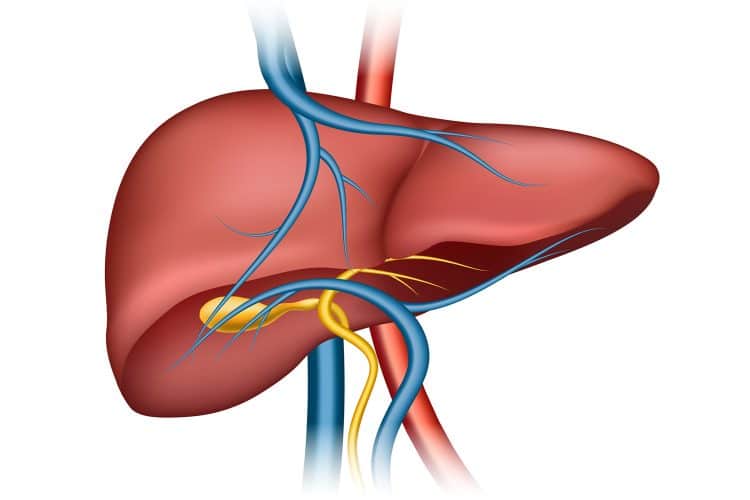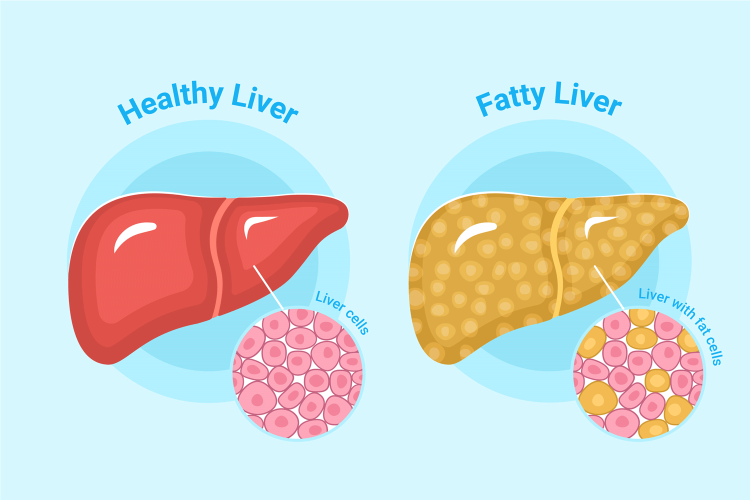Did you know intermittent fasting can also improve your liver health?
In this article, we explore the connection between intermittent fasting and liver health, understand the benefits of intermittent fasting on the liver, and present our conclusions based on scientific facts. So hop on as we begin our journey into intermittent fasting and its effects on liver health.
Intermittent Fasting and Health Benefits
For the uninitiated, intermittent fasting involves cycling between periods of fasting and eating. This abstinence period is known as the fasting window. Few practice it daily by staying away from calories for several hours each day, and the others do not eat anything for a couple of days or more each week. After the fast gets over, you are supposed to consume your daily requirement of calories in what is known as the feeding window.

Owing to its popularity, multiple intermittent fasting schedules have been devised. The most popular ones are 16/8, where you fast for 16 hours and eat in the remaining eight-hour window; the 5/2 approach, where you eat normally for five days a week and limit calorie intake to 500-600 calories on two non-consecutive days; and One Meal A Day fasting, where you fast for the entire day, and only have one meal at the end of the day.
There are other, more demanding intermittent fasting plans, too. If you are a hardened dieter, you could try a 3-day fast or even a monk fast, where you fast for 36 hours. Based on the schedule you follow, there are many amazing benefits that you can accrue from intermittent fasting. Here are some of them:
- Weight loss
- Reduction in insulin resistance [1]
- Possible cancer prevention (though not yet proven)
- Improvement in heart health [2]
- Brain health improvement and prevention of neuro-diseases like Alzheimer’s
- Anti-aging effects [3]
- Reduction in chronic inflammation [4]
Of all the benefits of intermittent fasting, the most sought-after is weight loss. Many people who have given up on traditional dieting find new hope in intermittent fasting. It is recommended that they start with a light fasting schedule, possibly 12/12, and gradually work toward more demanding IF routines like OMAD or Alternate Day Fasting.
Liver’s Role in the Body
The liver is the body’s largest solid internal organ and performs several crucial functions. It is responsible for processing nutrients from food, producing bile to help with digestion, playing an important role in regulating blood sugar levels in the body, and removing waste and toxins from the blood. It is also responsible for medication breakdown and storing minerals and vitamins in the body. If the liver does not function optimally, it can lead to health issues like fatty liver, cirrhosis, and hepatitis.

Relation Between Fatty Liver and Cellular Mitochondria
Much research has been done on the potential benefits of intermittent fasting on animal health and mitochondrial functioning. Mitochondria are cellular components that are responsible for the metabolism of energy. Before moving into this topic, it is important to note that most studies on IF and mitochondria have been done on animals. Hence, no definitive claims can be made that it will be observable in humans too.
Scientists believe improper mitochondrial functioning plays a huge role in non-alcoholic fatty liver disease. This theory is based on the fact that the mitochondria are responsible for the metabolism of fatty acids. NAFLD is partly caused by improper fat metabolism, where the fat ends up in the liver.
Intermittent Fasting and Fatty Liver
A systematic review and meta-analysis done in 2021, published in Frontiers of Nutrition, discovered that intermittent fasting could reduce liver enzymes in people with fatty liver disease. [5]
In this meta-analysis, most of the studies were conducted on participants observing Ramadan fasting, a close replication of the 16/8 fasting regime, where you fast for 16 hours and eat your food in the remaining eight-hour window.

Another 2021 systemic review and meta-analysis published in Diabetes Research And Clinical Practice confirmed the positive relationship between Ramadan fasting and decreased liver enzyme levels. [6]
Again, there was a 2019 randomized controlled trial by Scientific Reports that found that alternate-day fasting (with participants following 18/6 fasting every other day and eating 70% of usual food intake on the fasting days) reduced the enzyme levels in the liver, and also improved some markers of liver scarring and liver fat accumulation. [7]
In all the above studies, we cannot say with certainty that the results achieved by following the fasting protocols were independent of the weight loss that participants experienced. It has only been suggested (not proven yet) that intermittent fasting can improve the liver’s health independent of calorie restriction/weight loss because IF changes how our bodies utilize energy, favoring fat metabolism.
These results are encouraging, and you can certainly try intermittent fasting to beat non-alcoholic fatty liver disease, provided you also consider other things like diet optimization, physical activity, and strategic supplementation.
Intermittent Fasting, Liver Health, and Diabetes Prevention
In 2020, Australian researchers used modern analytical tools to try and understand how intermittent fasting works and its association with the liver to help prevent diseases. A study on mice found that 12 hours of daily intermittent fasting for 30 days reduced liver mass significantly and improved blood glucose levels. [8]
By studying the effect of proteins on mice’s liver, which can be suitable human biological models, scientists have come to a better conclusion about how fasting can reprogram liver proteins. The researchers found that the HNF4 protein is responsible for the regulation of a large number of proteins and that it plays a role in intermittent fasting.
Dr. Larance, who headed the research, says, “For the first time, we showed that HNF4-(alpha) is inhibited during intermittent fasting. This has downstream consequences, such as lowering the abundance of blood proteins in inflammation or affecting bile synthesis. This helps explain some of the previously known facts about intermittent fasting.”
During the study, it was also discovered that alternate-day fasting was responsible for changing the metabolism of fatty acids in the liver. This is vital knowledge that can be applied to find improvements in glucose tolerance and diabetes regulation.
Besides this, intermittent fasting can also reduce liver inflammation, thereby helping prevent liver diseases like fatty liver and liver cancer.
Tips For Maintaining a Healthy Liver
The liver is undoubtedly one of the most important organs in the body. If the liver stops working, toxins accumulate in the body, food cannot be digested, and medications will never leave the bloodstream. Here are some ways in which you can care for your liver.
Limit or Stop Alcohol Consumption
You are mistaken if you think only people with severe alcohol addiction get liver diseases like liver cirrhosis. Even 4 ounces of hard liquor (for men) and 2 ounces (for women) can start to scar your liver. Hence, highly regulate or abstain from alcohol. It is your best shot at avoiding liver disease.
Wash Vegetables and Avoid Toxins
Any vegetables you buy from the local market must be washed thoroughly before cooking. These vegetables have toxic chemicals sprayed on them to make them look fresh, which can have disastrous consequences for your liver’s health.

Prevent Hepatitis A, B, and C
Hepatitis A and B are viral liver diseases. Get yourself immunized if you think you may be at risk. Hepatitis B and C can become chronic and destroy the liver. They are transmitted through blood and other body fluids, so practice safe sex. Hepatitis A is spread through contaminated water and food, so wash your hands thoroughly as a safety practice.
Keep an Eye Out for Medications and Herbs
Many medications and drugs can be toxic to the liver. Please do your research thoroughly before taking any medicines.
Exercise and Eat Right
Keep fatty liver disease at bay by exercising regularly to avoid obesity. Also, eat the right kind of food.
How to Incorporate Intermittent Fasting into Your Schedule for a Healthy Liver?
If you want to assimilate intermittent fasting into your lifestyle to boost your liver health, you must start small. Begin with 12/12 fasting, where you fast for 12 hours and eat in the remaining 12-hour window. This method is great for the initial week of intermittent fasting. Gradually, you can work up to 14/ 10 fasting, fasting for 14 hours daily and eating your meals in the remaining 10-hour window.
Once you get used to 14/10 fasting, ramping up the fasting hours is easy. Attempt 16/8 fasting at this point, where you fast for 16 straight hours daily and consume all your meals in the remaining nine hours. After you are comfortable with the 16/8 regimen and have been practicing it for a few weeks, you should take it a notch higher, especially as the good results start showing.
Experienced intermittent fasters can easily do the “One Meal A Day” (OMAD) plan, where you eat only one meal daily and fast for the remaining time. Some graduate to a three-day fast or monk fast after doing OMAD for some time.
Frequently Asked Questions
What are the warning signs that your liver is not alright?
Here are the telltale signs that something is wrong with your liver:
- Jaundice, yellowing of the eyes and skin
- Pain and distention of the abdomen
- Swelling in the lower legs
- Forgetfulness and confusion
- Dark colored urine
- Pale colored stool
What foods are good for the liver?
Many foods have specific antioxidants and compounds that support liver function and repair. You can have blueberries, fatty fish, grapefruit, cranberries, olive oil, and broccoli.
What can I drink tea to flush my liver?
It is not possible to completely flush the liver. However, you can have beverages rich in antioxidants like tea, coffee, and beetroot juice to detoxify as much as possible.
Conclusion
Intermittent fasting comes with a host of benefits, including improved liver health. Studies have shown that it can prevent fatty liver disease. It also helps the liver maintain insulin levels and prevent type 2 diabetes. Intermittent fasting, according to studies, can also improve insulin sensitivity, reduce inflammation in the liver, and reduce liver fat.
Note: The content on Fitness Volt is for informative purposes only and should not be taken as medical advice to diagnose, prevent, or treat health problems. If you’re suffering from a health issue, are pregnant, or are under 18 years old, you should consult your physician before starting any new supplement, nutrition, or fitness routine.0
References
- Sathananthan, Matheni, et al. “Six And 12 Weeks of Caloric Restriction Increases Β Cell Function and Lowers Fasting and Postprandial Glucose Concentrations in People With Type 2 Diabetes.” OUP Academic, 1 Sept. 2015, https://doi.org/10.3945/jn.115.210617.
- Mani, Kartik, et al. “Lysosomes Mediate Benefits of Intermittent Fasting in Cardiometabolic Disease: The Janitor Is the Undercover Boss.” PubMed Central (PMC), 14 Sept. 2018, https://doi.org/10.1002/cphy.c180005.
- Alirezaei, Mehrdad, et al. “Short-term Fasting Induces Profound Neuronal Autophagy.” PubMed Central (PMC), 14 Aug. 2010, https://doi.org/10.4161/auto.6.6.12376.
- Alam, Iftikhar, et al. “Recurrent Circadian Fasting (RCF) Improves Blood Pressure, Biomarkers of Cardiometabolic Risk and Regulates Inflammation in Men.” PubMed Central (PMC), 19 Aug. 2019, https://doi.org/10.1186/s12967-019-2007-z.
- Yin, Cong, et al. “Effect of Intermittent Fasting on Non-Alcoholic Fatty Liver Disease: Systematic Review and Meta-Analysis.” Frontiers, 11 June 2021, https://doi.org/10.3389/fnut.2021.709683.
- “The Effects of Ramadan Intermittent Fasting on Liver Function in Healthy Adults: A Systematic Review, Meta-analysis, and Meta-regression.” The Effects of Ramadan Intermittent Fasting on Liver Function in Healthy Adults: A Systematic Review, Meta-analysis, and Meta-regression – ScienceDirect, 14 July 2021, https://doi.org/10.1016/j.diabres.2021.108951.
- Johari, Muhammad Izzad, et al. “A Randomised Controlled Trial on the Effectiveness and Adherence of Modified Alternate-day Calorie Restriction in Improving Activity of Non-Alcoholic Fatty Liver Disease – Scientific Reports.” Nature, 2 Aug. 2019, https://doi.org/10.1038/s41598-019-47763-8.
- Ma, Jianbo, et al. “Effects of Intermittent Fasting on Liver Physiology and Metabolism in Mice.” PubMed Central (PMC), 5 July 2021, https://doi.org/10.3892/etm.2021.10382.
